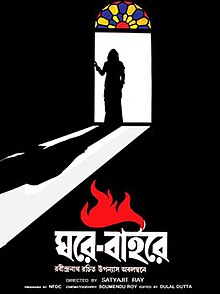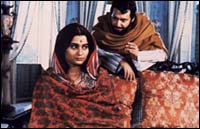Ghare Baire - Superhit Bengali Movie - Satyajit Ray | Victor Banerjee | ...with story ; movie free from you tube
Ghare Baire (film)
From Wikipedia, the free encyclopedia
| Ghare Baire (The Home and the World) | |
|---|---|

A poster for Ghare Baire
| |
| Directed by | Satyajit Ray |
| Produced by | NFDC |
| Written by | Satyajit Ray, from the novel by Rabindranath Tagore |
| Starring | Swatilekha Chatterjee (Sengupta) Victor Banerjee Jennifer Kendal Soumitra Chatterjee |
| Cinematography | Soumendu Roy |
| Edited by | Dulal Dutta |
Release date
|
|
Running time
| 140 minutes |
| Country | India |
| Language | Bengali/English |
Ghare Baire (The Home and the World) is a 1984 Indian Bengali romantic drama film by director Satyajit Ray, based upon the novel Ghare Baire by Rabindranath Tagore. It features Soumitra Chatterjee, Victor Banerjee, Jennifer Kendal (in her last film appearance) and Swatilekha Chatterjee (Sengupta). Ray prepared a script for it in the 1940s, long before he made his first film Pather Panchali. It deals with a subject that has often appeared in Ray's work: the emancipation of women and what it does to them and to the men who love them.[1] The film was in competition for the Palme d'Or at the 1984 Cannes Film Festival.[2]
Plot synopsis[edit]
The story is set in early 20th century India (specifically, 1907) in the estate of the rich Bengali noble Nikhilesh (Victor Banerjee) and in the chaotic aftermath of Lord Curzon's partition of Bengal into Muslim and Hindu states; the nationalist movement is trying to impose a boycott against all foreign goods (by claiming that imports are at the root of Indian poverty). He lives happily with his beautiful wife Bimala (Swatilekha Sengupta) until the appearance of his friend and radical revolutionist, Sandip (Soumitra Chatterjee).
Sandip, a passionate and active man, is a contradiction to the peace-loving and somewhat passive Nikhil. He easily attracts the innocent and unsuspecting Bimala, creating a love triangle.
Although Nikhilesh figures out what is happening, he is a mature person and grants Bimala the freedom to grow and choose what she wants in life (as their marriage was arranged when she was a girl). Meanwhile, Bimala experiences the emotions of love for the first time in a manner that helps her understand that it is indeed her husband Nikhilesh who really loves her.
Importantly, Nikhilesh tells Bimala that he would like her to have a life not only inside the home, but outside of it as well—a most controversial matter when the novel was written.

মন্তব্যসমূহ
একটি মন্তব্য পোস্ট করুন